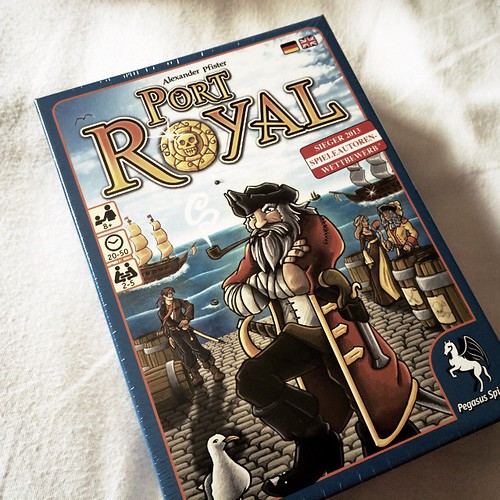
I first heard about Port Royal via a post that Tim G made either on the Tavern, or on Facebook, talking about his board gaming evenings. I was intrigued, as the idea of a game set in the golden age of sail with expeditions, trading and the like seemed right up my street. Anyway, I subsequently managed to play it 4 times at Continuum 2014 at the end of July and ended up ordering a copy before the convention had ended. This is a short review of the game.
- The game is entirely card based, and the only thing it is lacking is a first player token.
- It is an interesting combination of a trading game, with missions and a push your luck element.
- The back of the cards serve as game currency. As you spend these they go back in the discard pile, which cleverly keeps the deck mixed up.
- The setting is either the Caribbean or old Europe, and you represent a harbour owner building for expeditions by trading and getting the right people together.
- Your aim is to win the game by getting 12+ Victory Points.
- Each turn, you draw cards into a hand (‘your harbour’ ). There is no limit to the number of cards you can draw but you can go bust or end up really helping your opponents.
- Cards are either ships, people or more rarely an expedition card or a taxation card.
- Ships generate income. They are distinguished by flag colour, the number of coins that you will gain from them if you allow them to trade in your harbour, and the strength of their forces (rated from 1-5 swords or a skull-and-crossbones). Draw two ships of the same colour flag and you go bust, ending your go.
- People come in a variety of types. They include: sailors (useful as they come with swords that can repel ships with a force strength less than the total rating the harbour has from sailors) and traders (who boost the number of coins you get from certain flagged ships); settlers, captains, priests (useful as groups of them can be traded in to complete expeditions); and higher cost cards such as the governor (allows you to take more cards than usual), the fraülein (makes each subsequent card purchase cheaper) and others that generally make it easier for you later in the game. Most people cards give you Victory Points.
- Expedition cards must be played into the centre of the table when you draw them. They each have a pre-requisite number of people cards that need to be exchanged to gain them (for example, two settlers and a priest), but in return you get an increased number of Victory Points (VP) and some extra gold. You can only do this exchange in your own turn.
- Taxation cards act as a control element in the game, with anyone with more than 12 coins being forced to half the number they have. Then someone will benefit (for example the player with the lowest number of VP, or the biggest army of sailors) with an extra coin.
- Once you have drawn as many cards as you want into your harbour without going bust, you can take one of the cards if you can afford them, gaining coins from ships and spending coins to buy a person. You then pass the hand to the next person around the table, and they can also take a card. If they do, they must also pay you 1 coin in tax (so everything costs slightly more to do out of your own turn). This continues until the harbour runs out of cards or no one can afford or wants what is left.
- The next player then takes their turn. When someone hits 12 VP, they must declare it. The game enters its end-phase then and play continues until every player has completed the same turn. At this point VP are compared and the winner declared.
- The game has a very Euro-game feel. This is unsurprising as it is German, but what it means is that the game stays very close until the very end. Unlike some more US style games it is not obvious early on who will win, and early expedition success does not guarantee victory.
In conclusion, I loved it.
No comments:
Post a Comment